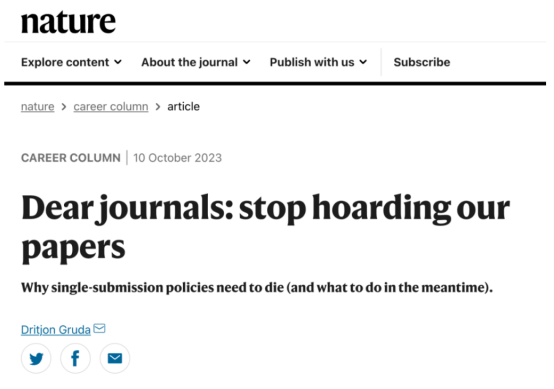Please click the button below to go to our email login page
|
Nature column article: The time is ripe to reassess the “multiple-submission” ban!On Oct. 10, 2023, a perspective article in Nature column pointed out that the “multiple-submission” ban should be abolished.
The author, Dritjon Gruda, is an organizational behavior researcher at the Universidade Católica Portuguesa, who introduced his experience in the article. Protracted submission progression During the COVID-19 pandemic, Dritjon Gruda and his colleagues submitted a paper to a premier journal in their field, examining the effects of the onset of the pandemic on individuals’ mental health, on the basis of their personality traits. This was a time-sensitive piece, but the paper was suspended for several months without even being sent out for peer review. Multiple e-mails to the journal received no response, and yielded no progress. Therefore, they had to withdraw the paper and submit it elsewhere, losing valuable time. This could have been avoided, had they been allowed to submit the manuscript elsewhere simultaneously. Another time, they submitted a paper to a journal, which was promptly reviewed by one reviewer. The editor, however, couldn’t find another and asked them to suggest any possible reviewers. They did, although with hesitation. Asking authors to recommend reviewers can compromise the objectivity and rigor of the peer-review process because authors might suggest individuals who are more likely to provide favorable reviews. It took nine months and several proactive follow-ups for the editor to realize that their paper had been overlooked and was severely delayed. Eventually, after a revision request, their paper was published ---almost a year later. How ridiculous this is getting: imagine that only one job at a time can be applied and the feedback is provided several months later before considering another opportunity. Such a scenario would definitely hinder career progression. Yet, this exact practice persists in scientific publishing. Is the multiple-submission reasonable? “Multiple-submission” refers to that fact that one author or different authors in the same research group, without the knowledge of journal editors and reviewers, attempt to publish or have published papers with identical or similar contents in multiple journals simultaneously or successively. The multiple-submission ban stems from the pre-digital era, which was set due to wasting of resources, chaotic review, disruptions on fairness of peer review, copyright, etc. and for maintaining “the fairness, justice and high standard of the academic community”. Dritjon Gruda thinks that the multiple-submission ban seems outdated and, at times, grossly unfair. This not only delays the progress of scientific research, but also restrains the rapid dissemination of scientific information, which is critical in emerging infectious diseases (such as COVID-19), climate science, material science and other fields. Moreover, for researchers who have academic demands or just start work, the long review process both wears down their mind and body and hinder the development of scientific career. He suggests it would be better to change the current policy rather than accept it. |

